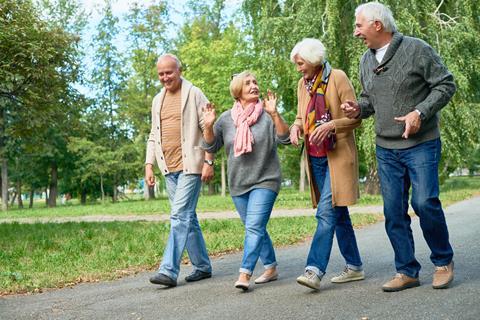Bev Taylor, director of strategy for the National Academy for Social Prescribing, reveals how vital social prescribing is going to be to our society going forward and says churches have already been successfully engaging in it for centuries.

Churches and other faith organisations have always been at the heart of local communities, supporting not only people’s faith, but also their social, emotional and personal wellbeing. The NHS move towards social prescribing, connecting people to practical and emotional community support based on a model of asking ‘What matters to you?’ can include churches and other faith groups, increasing the amount of local community support available.
Up to one in five patients in the UK go to their general practitioner for issues that are not exclusively or even mainly addressed by medical treatment, but could be better solved by activities such as arts, culture and heritage, financial and life advice, physical activity and, increasingly, access to nature and green spaces. One of the key strategic shifts in the NHS Long Term Plan is a commitment to growing social prescribing, so by 2023/24 every GP practice in England will have access to a social prescribing link worker.
Up to one in five patients in the UK go to their general practitioner for issues that are not exclusively or even mainly addressed by medical treatment, but could be better solved by social prescribing.
Around the country there are already numerous activities and offerings from faith organisations, with churches and places of worship supporting parishioners and local community members with their health.
Natural habitats found in churchyards
Churchyards are often the oldest enclosed piece of land in a parish, and offer an opportunity to not only get to know wildlife but also improve wellbeing, connections and even physical fitness. Wilder Churches is a partnership initiative between Somerset Wildlife Trust and the Diocese of Bath and Wells (somersetwildlife.org/events/wilder-churches). They are making the nature and green spaces that churches own more accessible.
David Shreeve, environmental adviser at the Church of England, said: ‘Churches and faith organisations are often based in areas where there are little or no gardens or green space. We hope our Green Health programme can help encourage them to see how the smallest space can be used to create a garden for their local community to share. Lockdown has proved just how vital access to nature is to our wellbeing. Working in a garden, especially with others, can bring huge benefits both physical and mental to all ages. We hope by reporting examples of existing projects they will encourage more to be created and bring the many benefits of gardening to people of faith or no faith.’
Lockdown has proved just how vital access to nature is to our wellbeing.
Activities promoting wellbeing
But it’s not just churchyards. Central to their community, churches are finding ways to engage local people in activities that provide meaning and a sense of purpose, enhancing their wellbeing.
St Mary’s Church in Ross on Wye run activities such as a Toddle and Toast, job club and a bereavement group. They are working with CLOVER (Creative Leisure Outdoors & Volunteer Exchange Ross-on-Wye, Ross-on-Wye Community Development Trust) to identify ways in which they might help in developing social prescribing initiatives, using the fantastic open space and facilities that St Mary’s can offer. Supported by the National Academy for Social Prescribing’s Thriving Communities Fund, the CLOVER project will pilot a sustainable, creative and transferable model of social prescribing that will see the church’s networks expanding to support those at risk of poor wellbeing.
Hetton New Dawn is the community outreach arm of the church in the Coalfields. As well as providing much needed resources, they have created social spaces where relationships can be built and flourish. With a robust network, they have one part-time community development worker who is a local church member, employed for 18 hours week, who works with approximately 30 volunteers from five different local churches and from the wider community. They work alongside the Loaves & Fishes foodbank, coming together with local organisations and churches in the area. They provide food parcels to those in need and digital support with job search facilities and form-filling support.
Social prescribing works because it connects people to activities in their local community, and focuses on finding what works and matters to each individual.
Every individual matters
Social prescribing works because it connects people to activities in their local community, and focuses on finding what works and matters to each individual. This is something churches and other faith organisations have been doing for centuries. Now there is a momentum behind this, with the NHS investment in social prescribing, we hope to learn more about how faith groups continue to support people to live their best lives, and thrive in their communities.
For more information go to socialprescribingacademy.org.uk and more details of the communities fund can be found here.

































No comments yet